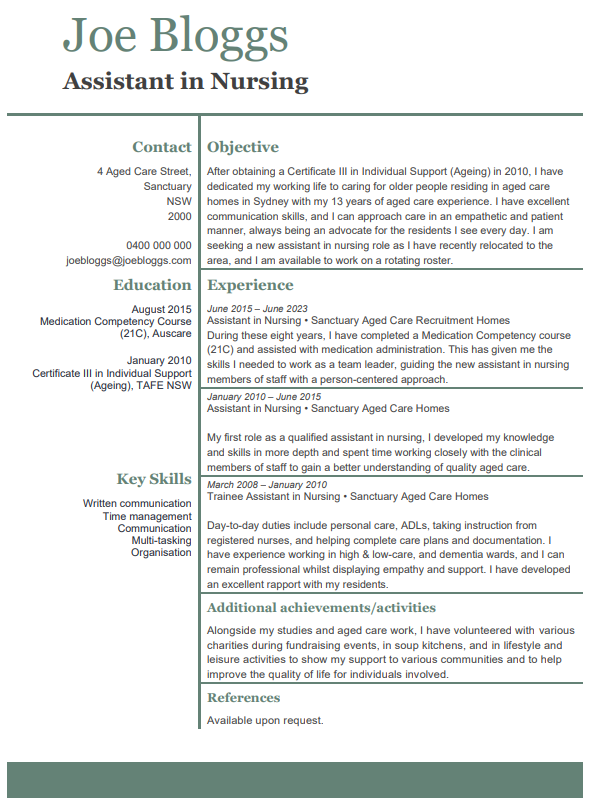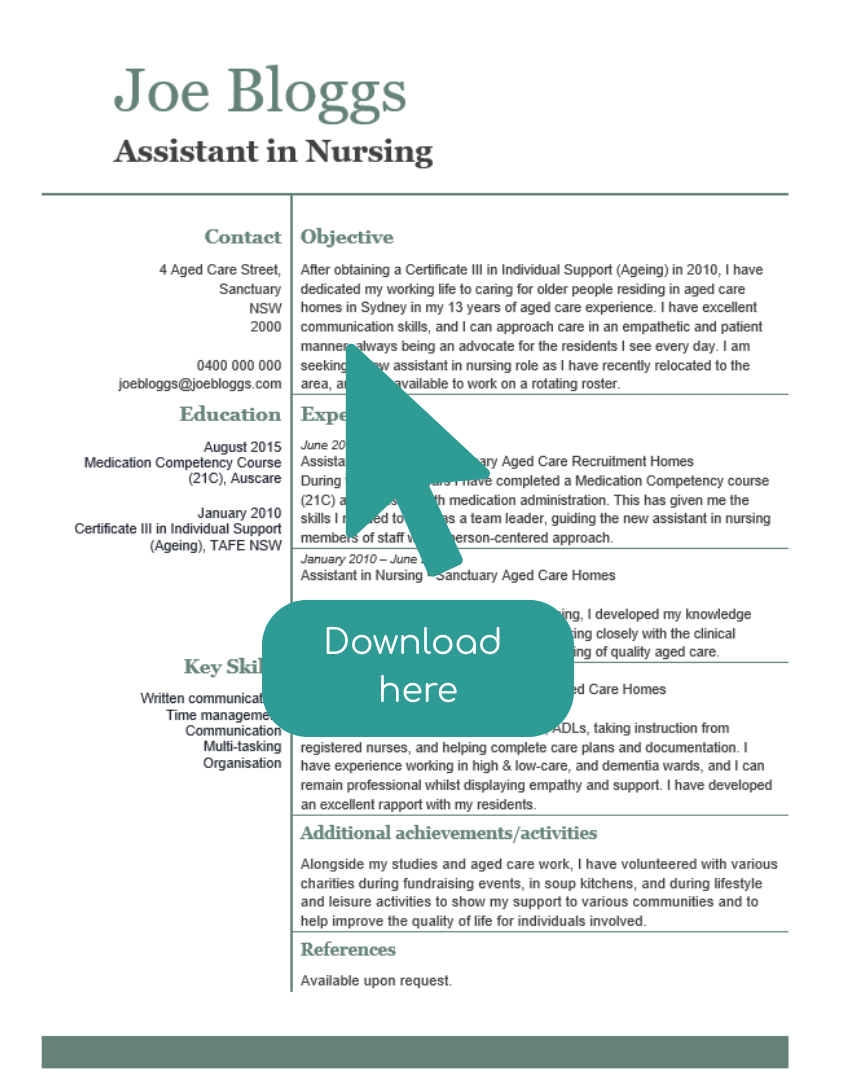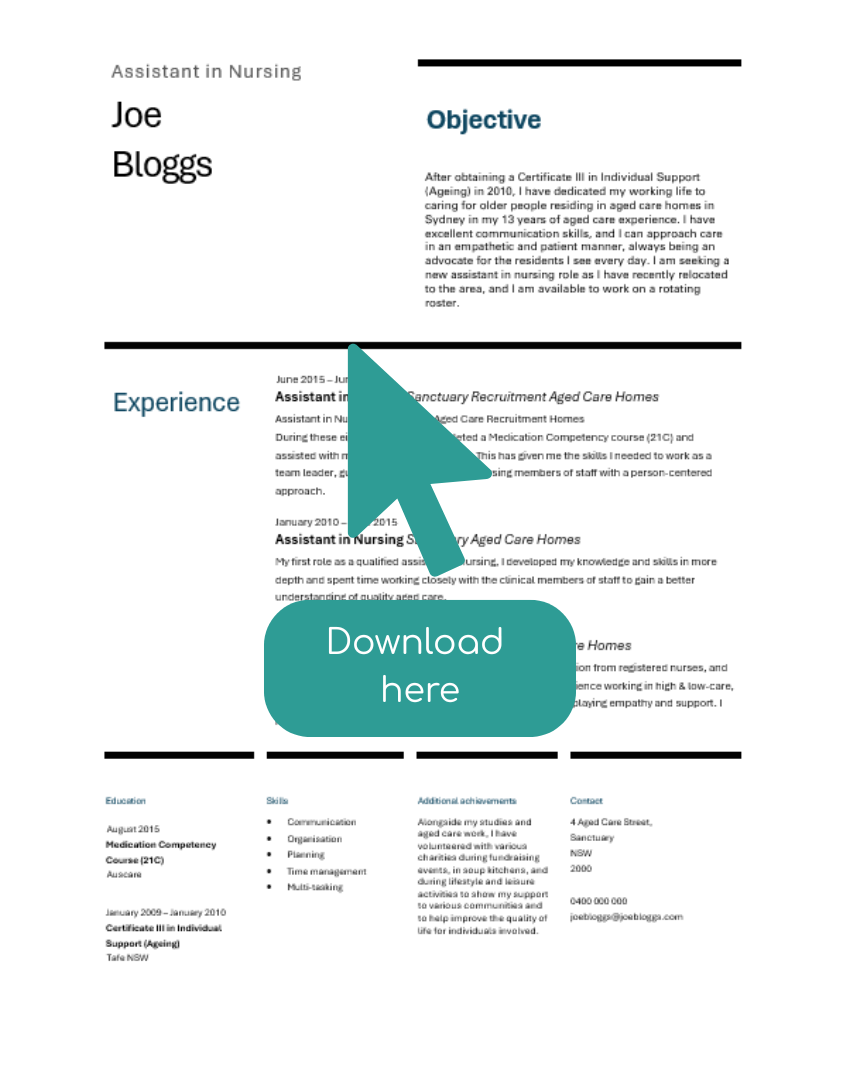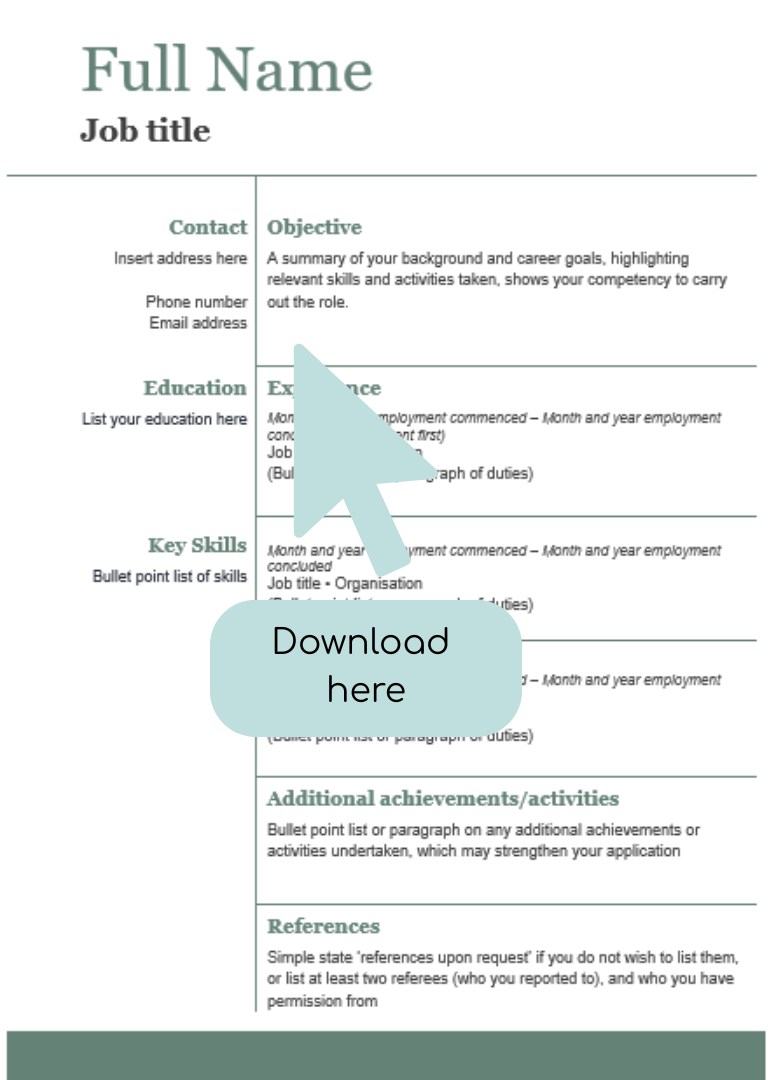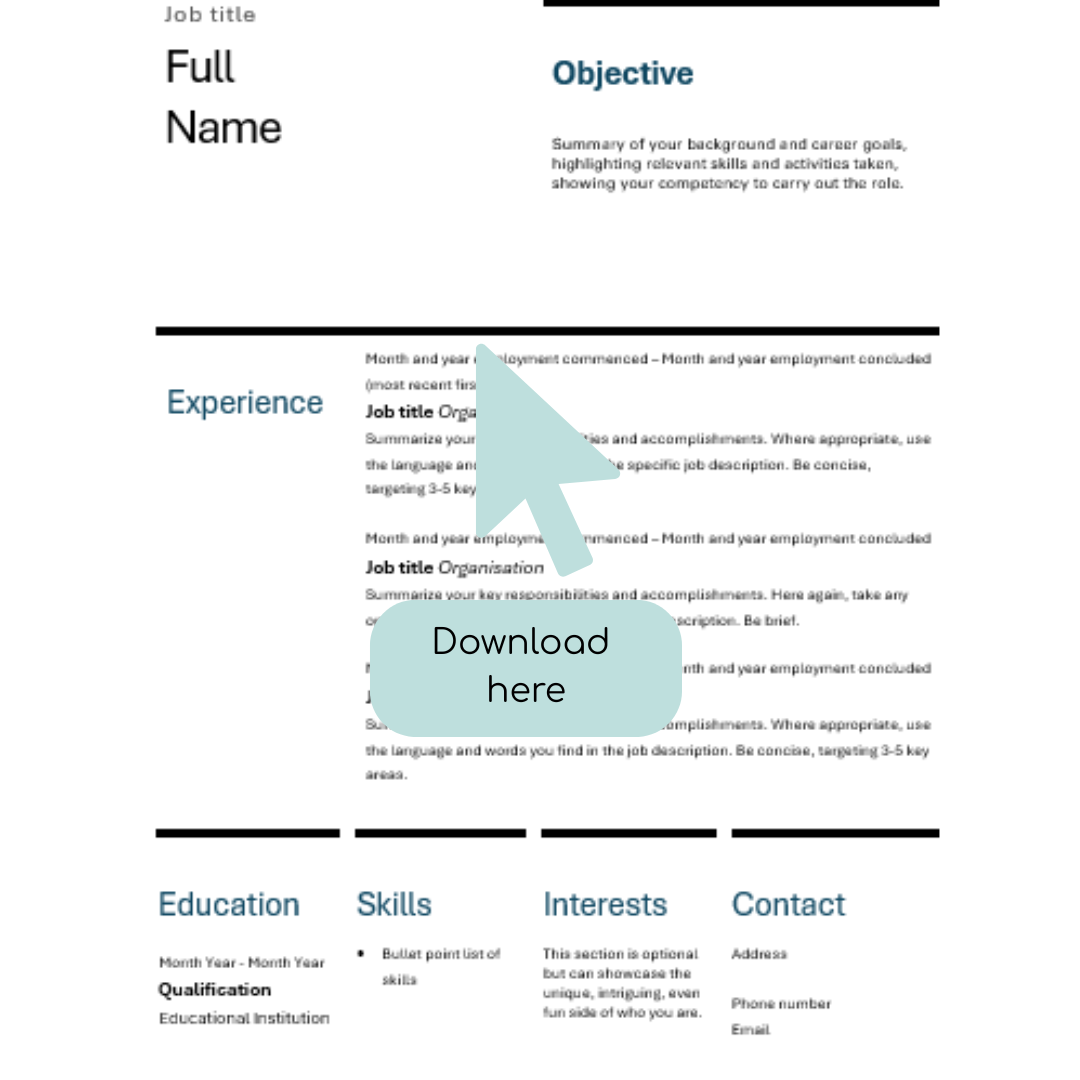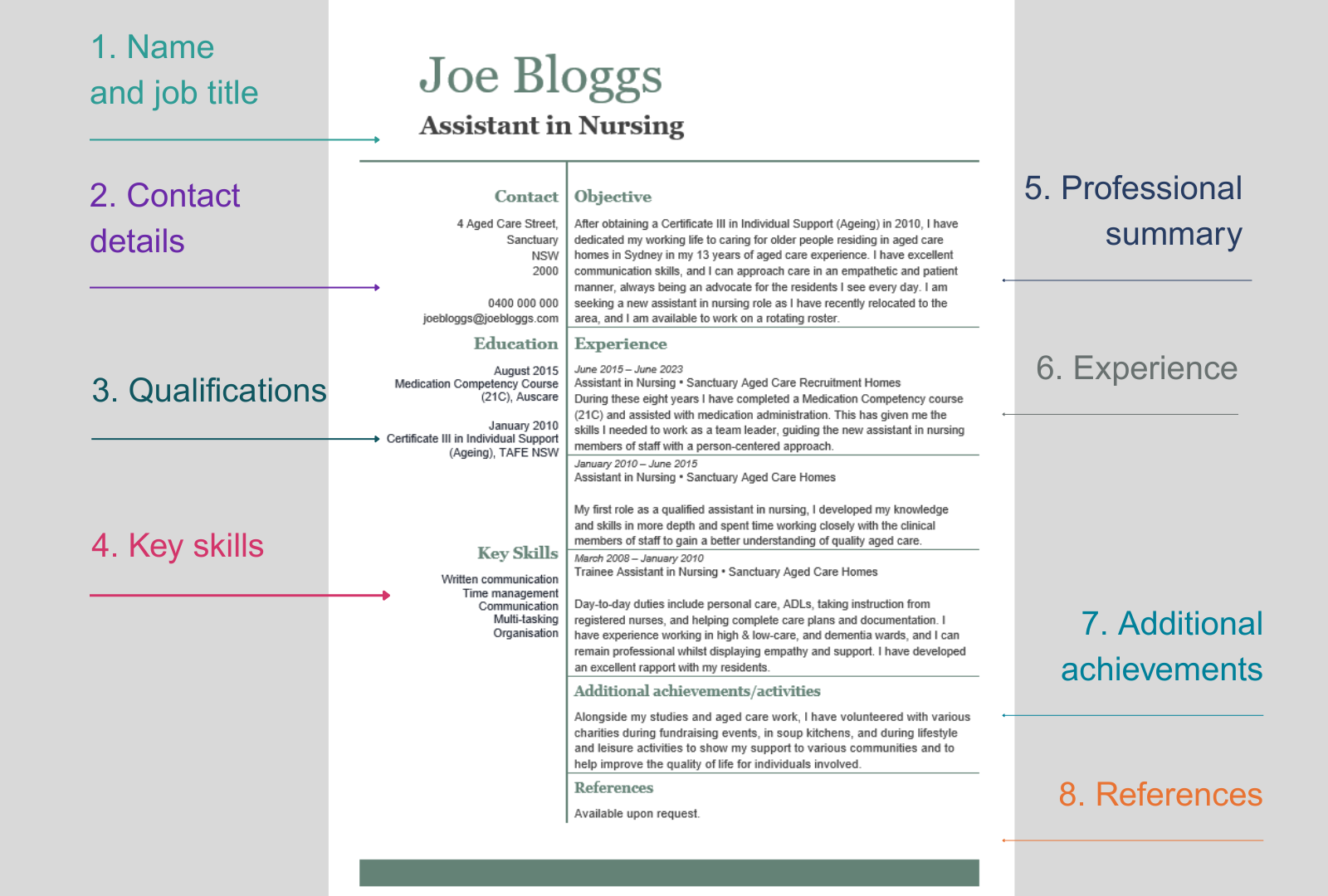
Aged care worker resume sample and tips
First published: January 2024
When looking to land your dream job, standing out from the competition can be done through a carefully crafted aged care resume. Showing off your invaluable experience and aged care qualifications is essential, but it can be difficult to know where to start.
Within this blog, we’ve detailed how to perfect your aged care resume. You’ll find:
- An aged care resume sample
- Aged care resume templates
- Tips on how to write a strong aged care resume
Regardless of whether you are looking to transition into the industry, seek a promotion, or are just entering the workforce, this resume builder can be adapted for multiple applications.
Aged care resume sample
An aged care resume should be easy to read but thorough. Condensing your education, skills, and experience into a one-to-two-page document is never easy, but we’re here to help you get the task done. We’ve put together an aged care resume sample that does just that:
Joe Bloggs
Sydney, NSW, 2000
joebloggs@sanctuaryrecruitment.com
0400 000 000
A caring and passionate aged care worker experienced in providing holistic care to aged care residents.
After obtaining a Certificate III in Ageing Support in 2010, I have dedicated my working life to caring for the elderly population across residential aged care homes in Sydney. Throughout my 13 years of aged care experience, I have developed a deep understanding of the industry, and I am keen to keep progressing my knowledge and skills in this area. I have excellent communication skills with the ability to remain empathetic and understanding, advocating for the residents I care for every day. I am seeking a new assistant in nursing role as I have recently relocated to the area, and I am available to work on a rotating roster.
Education
Qualifications obtained
Certificate III in Ageing Support
TAFE NSW 2009 – 2010
Work Experience
Assistant in Nursing
Sanctuary Aged Care Recruitment Homes 2015 – 2023
I was employed in the position of assistant in nursing and my day-to-day duties included personal care, ADLs, taking instruction from registered nurses, and helping complete care plans and documentation. I am medication competent, so I also administer medications when appropriate. I have experience working in high & low-care, and dementia wards, and I can remain professional whilst displaying empathy and support. I have developed an excellent rapport with my residents.
Assistant in Nursing
Sanctuary Aged Care Homes 2010 – 2015
I joined Sanctuary Aged Care immediately after qualifying and put my education into practice through ADLs, personal care, and assisting with care plans. I was present through the accreditation process and worked with my colleagues and management team to ensure the home received accreditation status. Nearer the end of my time there, I was an AIN team leader. I mastered the new note taking and recording system we adopted and developed the ability to communicate with residents from all backgrounds.
Skills
Throughout my education and career, I have acquired the following skills:
- Communicating with residents with culturally diverse backgrounds
- Nonverbal communication
- Empathy and patient advocacy
- Manual handling
- Patience
- Multi-tasking and working under pressure
- Organisation
References available upon request.
Download our aged care resume samples
An aged care resume template
[Full name]
[Physical address]
[Email address]
[Phone number]
Professional summary
[A few sentences detailing your background and career goals, highlighting relevant skills and activities taken, showing your competency to carry out the role]
Education
Qualification obtained
[Institution]
[Dates of study]
Repeat if needed
Work Experience
[Job title]
[Organisation]
[Dates of employment]
[List your duties and responsibilities. This can be in bullet point or paragraph format]
Repeat as many times as necessary
Skills
[Bullet point lists of relevant skills]
References
[You can write here ‘references available upon request’, or list them. It’s ideal to have at least two references to direct members of staff you reported to]
Download our aged care resume template
How to create a standout aged care resume
Your aged care resume layout
It is important to format your aged care resume in a way that helps you stand out to potential employers. It should contain:
Your contact details
Within your aged care resume, make sure that you always include:
- Full name
- Phone number
- Email address
- Location (suburb, postcode, and state)
Professional summary or objective
Next, it’s important to add in a summary that highlights your experience, aged care qualifications and personality in a few sentences. We understand that this can be a tricky task and would recommend that you try to do the following:
- Highlighting your qualifications – always include how you have actively put these into practice. Simply listing your qualifications won’t be as effective.
- Mentioning skills and knowledge – this will show you’re proactive in personal development and eager to learn.
- Stating what you are looking for – you don’t necessarily have to mention the salary you expect but can talk about what you’re looking for in your new aged care role.
Work history and experience
This is potentially the most important part of your aged care resume. When you’re creating the section, always detail your most recent experience first and your oldest last. If you’re still in a position, use ‘Current’ as your end date. You can also split your experience into paid and voluntary roles.
When going into detail about the work you carried out at your previous jobs, make good use of the advertisement that you are applying for. If the advert homes in on a particular skill set or knowledge area, include clear examples of how you have used this skill or knowledge in your employment. That way, you highlight explicitly to the employer that you are highly suitable for the role.
Education and qualifications
In this necessary part of your aged care resume, you must show you have the education requirements for the role you’re applying for.
For each qualification, you should include:
- The name of the qualification
- The institution
- The year you got the qualification
Key skills
You may want to add a section that lists the skills that you’ve developed through your study or work experience. If you’re going to include this, make sure it is relevant to the job advert otherwise it can seem that you’re short of things to say about yourself.
When thinking about the layout of your aged care resume, bullet points can be a simple yet effective way of including your key skills.
Aged care references
References are non-negotiable. You need to make sure you have at least two clinical references (if possible) with their permission ready to go. However, you don’t necessarily need to have these on your aged care resume.
Adding in ‘References available upon request’ shows you’re able to fulfill the requirement whilst keeping your referee’s personal details confidential.
Include a cover letter
Your cover letter should complement your resume by adding personality and context to your professional background, helping employers see beyond the bullet points. Here’s what to include:
- An introduction expressing your interest in the role
- Your relevant qualifications and any additional training that enhances your suitability
- Your work experience, including your previous responsibilities
- Your key skills and strengths
- An explanation of why you want to work for the employer and how your values and experience align with their mission
- A strong closing statement that reiterates your enthusiasm for the role
Extra tips for building an excellent aged care resume
Your aged care resume should be simple to edit so that you can easily tailor it to the job you’re applying for. The foundation can be the same, but having this flexibility can increase the likelihood of receiving those job offers. Also keep these tips in mind when writing your resume and applying for new jobs:
- Remember what you’re applying for – your resume shouldn’t be stagnant. Read the job advertisement properly and tailor your resume to it. Emphasise the skills and knowledge that the employer is looking for.
- Sell yourself – your resume is about you and what you bring to the table. Don’t be shy in advocating for yourself and highlight what you are great at.
- Be honest – as tempting as it is to fabricate some points on your resume, this will ultimately hinder your application. If you don’t have the amount of experience they’re asking for, don’t say that you do. Instead, focus on what you do know and emphasise why you’re the ideal candidate, experience or not.
- Don’t be afraid to apply for jobs that you don’t meet the exact requirements for – you will need the relevant aged care qualifications, but lacking experience in a certain area shouldn’t necessarily be a reason not to apply. Many employers will consider your application if you display the right attitude, enthusiasm, and willingness to learn.
- Use the correct formatting – choose a clear font, a good size text (11 works well), bolding for headers and bullet points for structure. Having a resume that looks good gives the employer all the more motivation to read it
- Proofread your resume – a resume with mistakes doesn’t look professional and may be neglected, no matter how strong a candidate you are.
Got everything you need to make a standout aged care resume? Read our tips and advice on how to prepare for your aged care interview so that you can secure your dream role.
Aged care jobs with Sanctuary
Writing an aged care resume and the job application process can be daunting, but we hope this article will help you when you’re next looking for a role. If you’re in the market for a new opportunity, would like to see what we roles we have available, or for a confidential career discussion, please call us on 02 8549 8101 or for a free resume assessment, submit your resume below:

